 Hair loss is a common side-effect of some chemotherapy and radiotherapy treatments for lymphoma. While hair loss from chemotherapy is temporary, it affects the hair all over your body. However, hair loss from radiotherapy is often permanent, but only affects the area of your body being treated with radiotherapy.
Hair loss is a common side-effect of some chemotherapy and radiotherapy treatments for lymphoma. While hair loss from chemotherapy is temporary, it affects the hair all over your body. However, hair loss from radiotherapy is often permanent, but only affects the area of your body being treated with radiotherapy.
Whether your hair loss is temporary or permanent, it is likely to have an emotional impact. Many people have said losing their hair was what made them feel, and look like a cancer patient. Losing your hair can be a scary or upsetting thought. It is very normal to worry about this.
On top of how our hair makes us look and feel, it also provides protection from cold weather or sunlight, and provides a barrier so our heads are protected from friction.
On this page we will discuss what to expect, and ideas on how to manage hair loss.
What makes hair fall out?
Chemotherapy and radiotherapy both cause hair loss because they attack fast growing cells. However, neither chemotherapy or radiotherapy can tell the difference between healthy and cancerous fast-growing cells. Our hair is always growing so that makes our hair target for these treatments.
Do all treatments cause hair loss?
No. There are many treatments that do not cause hair loss. Some chemotherapies will only cause hair thinning, but not total loss. Immunotherapies and targeted therapies may also cause some hair thinning, but most of these treatments do not cause hair loss.
Does hair loss mean I have a worse lymphoma?
No – there are more than 80 different subtypes of lymphoma. The treatment for lymphoma is dependent on many things including the subtype. Even if you don’t lose your hair, you still have lymphoma, which is cancer. Many newer treatments are more targeted, which can reduce some symptoms such as hair loss.
What hair will I lose?
All of it!
Chemotherapy will affect all your hair, including hair on your head, eyebrows, eye lashes and facial hair, pubic hair and hair on your legs. Your hair will start to grow back within weeks of finishing treatment.
However, if you are not having chemotherapy, but are having treatment with radiotherapy, you may just lose a patch of hair in the area being treated, but this hair will likely not grow back. If it does grow back, it may be much thinner than before treatment.
What does it feel like?
You may notice your head starts to tingle, itch, or ache as your hair gets ready to fall out. Some people mention they have a headache that feels like having their hair pulled too tight. While others don’t have any discomfort at all. If the sensation or pain is too much, or is causing you anxiety, you may like to try cutting your hair very short or shaving it, before it all falls out.
How and when does the hair fall out?
Most people will lose their hair within 2-3 weeks of having their first treatment. It often starts to fall out in clumps, that you may notice on your pillow or when you brush or wash your hair.
By your second cycle of chemo, you will probably have lost all the hair on you head. Once the hair on your head is gone, you may feel the cold more than usual. Wearing a soft beanie, scarf or wig may help.
Common protocols and alopecia
There are many different treatments for lymphoma. Some will cause hair loss, while others will cause your hair to thin and not seem so full. Others will not have any affect on your hair.
Common protocols that will result in hair loss
- CHOP and R-CHOP
- CHEOP and R-CHEOP
- DA-R-EPOCH
- Hyper CVAD
- ESHAP
- DHAP
- ICE or RICE
- BEAM
- ABVD
- eBEACOPP
- IGEV
Protocols that may cause hair thinning or no hair loss
- BR or BO
- GDP
- Monoclonal antibodies such as rituximab, obinutuzumab, brentuximab, pembrolizumab or nivolumab (Unless given with a chemotherapy that causes hair loss)
- Targeted therapies such as BTK inhibitors, PI3k inhibitors, HDAC inhibitors or BCL2 inhibitors
Impact of NOT losing your hair
Do cool caps help prevent hair loss?
Cool caps are generally not recommended for people having treatment for lymphoma.
Some people with certain cancers can wear a cold cap on their head to help reduce the amount of chemotherapy that gets to their head. This minimises or prevents hair loss. However, lymphoma is a systemic cancer, meaning it can grow in any part or your body, including lymph nodes, skin, bones, and organs.
For this reason, cool caps are not suitable for most people having treatment for lymphoma. Wearing a cool cap can prevent the chemotherapy reaching some lymphoma cells, leading to early relapse of your lymphoma. A relapse is when your lymphoma comes back.
There may be some rare exceptions. If your lymphoma is localised and not thought to have spread (or likely to spread), you may be able to wear one. Ask your haematologist or oncologist if this is the case for you.
Emotional impact of losing your hair
You may worry about losing your hair because of how it will change the way you look; And the way you look may be an important part of your identity. Whether it’s hair on your head, a beard and/or moustache or other hair you lose; An unwanted change in your identity, or change to your appearance can cause fear, anxiety and sadness.
For some, it may be the thing that makes you feel or look like you have cancer.
Hair loss is a big deal!

How to manage emotions
Recognise and acknowledge how losing your hair makes you feel. Give yourself time to grieve and talk to the people around you about how you, and they feel.
You may like to cut your hair or trim your beard/moustache before it starts to fall out, or even before your start treatment. This gives you some control over the hair loss, and allows you to slowly get used to the change in your appearance. Give yourself permission to play with different looks and have some fun with it.
- Dye your hair a colour you never thought you would – just for fun
- Try a new hair do
- Experiment with wigs, turbans and scarfs
- Shave as a team – get your friends and family to go hairless too
- Embrace your new bald look – maybe even book in for a professional photo shoot.
- Experiment with different lengths of your beard, beard with no moustache or moustache with not beard
- Contact Look good feel better to learn tips on drawing on eybrows, skin care and wrapping turbans (Contact details at the bottom of this page).
- Contact the Cancer Council’s wig service (Contact details at the bottom of this page).
Involving children
If you have young children in your life, they may also find it strange when your hair falls out, and may have difficulty recognising you at first. Think about how you can get them involved and make your hair loss a fun activity for the kids in your life.
If it is your young child having treatment for lymphoma, ask their school or day care centre how they can get involved to make the hair loss a fun activity, that also helps your child’s friends understand what is going on.
Some fun ideas for getting kids involved:
- Crazy hair day
- Goodbye hair party
- Painting or glitter to decorate head
- Playing with dress ups and wigs
- Photoshoot with different looks
Counselling
If your sadness or anxiety about losing your hair is affecting your everyday life, talking to a counsellor who works with people with cancer can help. Ask your doctor for a referral. There are also some phone counselling services you can contact without a referral. Find details under other resources at the bottom of this page.
Patient support line
You can also contact our Lymphoma Care Nurses on 1800 953 081 or by emailing nurse@lymphoma.org.au
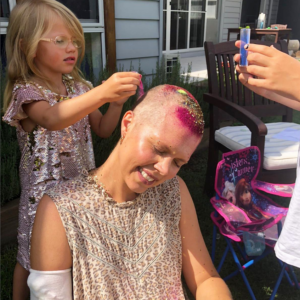

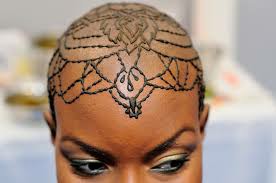
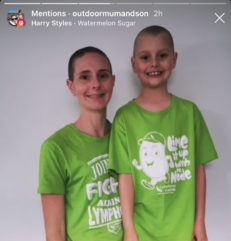


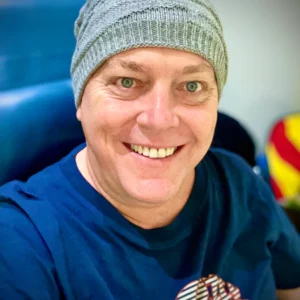


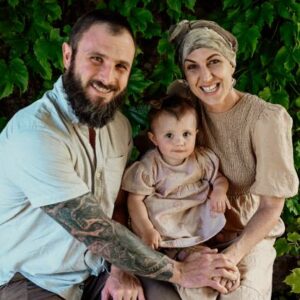
Taking care of your skin and scalp after hair loss
When you lose your hair, whether it is from your head, face or body, you will need to take care of the skin that is now exposed. Skin can become dry, itchy or more sensitive to the weather and light touch. Radiation treatment can also cause irritation to your skin resulting in blisters and a sunburn type of feeling.
Things to consider:
- Have luke warm showers – your skin and head will be more sensitive to hot and cold water.
- Use a good quality, non-scented moisturiser on your head and skin.
- Wear soft hats, beanies or scarves – avoid ones with seams as these may be too rough.
- Protect yourself from the sun – wear long sleeved natural fibre clothes, and wear decent sun block cream.
- Use a pillow case made from natural fibres such as cotton, linen or bamboo.
When will my hair grow back?
Hair usually starts to grow back within weeks of finishing treatment with chemotherapy. However, when it does grow back it may be very thin – a bit like a new babies. This first bit of hair may fall out again before growing back.
When your hair does come back, it may be a different colour or texture that it was before. It may be curlier, greyer or grey hair may have some colour back. After about 2 years, it may be more like the hair you had before treatment.
Hair normally grows about 15cm each year. This is about half the length of an average ruler. So, 4 months after you finish treatment, you may have up to 4-5cm of hair on your head.
If you have radiotherapy, the hair in the patch of skin treated may not grow back. If it does, it may take years to start growing back, and still not grow back to the normal way it was before treatment.
Where to get a wig or head piece
Look good feel better is a patient organisation that helps you find ways to feel good about yourself even as your appearance changes throughout cancer treatment. They have put a list together of places that sell or lend wigs and other pieces in each state. They also conduct workshops to teach you about making (including drawing on eyebrows) and how to wear different head pieces.
Click the link below for a list of contacts and workshops.
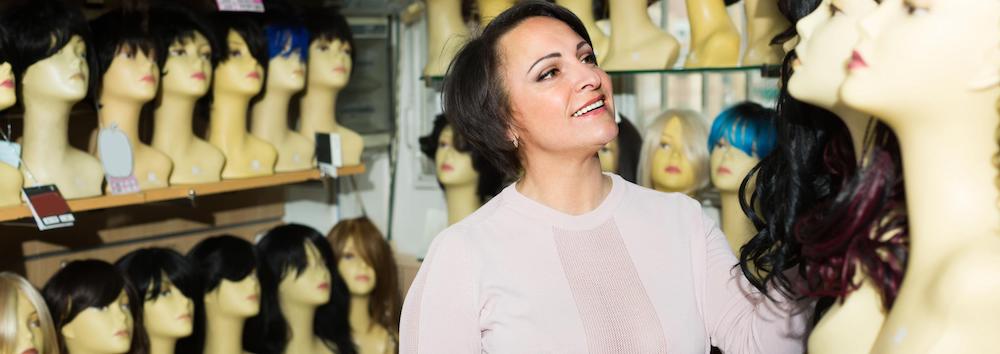
Summary
- Treatment with most chemotherapies will cause hair loss on your head, face and body, but it is temporary – your hair will grow back after treatment.
- Radiation treatment can also cause hair loss, but only on the area of your body being treated. This hair loss may be permanent.
- Some treatments will not cause hair loss. This does not mean your lymphoma is less serious.
- Take care of your scalp and skin that may become more sensitive to temperature and touch when your hair is gone.
- Use unscented soaps and moisturizers.
- It is very normal to feel anxious about your hair loss. Call our Lymphoma Care Nurses if you need some one to talk to about how you are feeling.
- If there is time before treatment starts, try doing fun things with your hair, experiment and get friends and family involved.
- Cutting your hair short, or shaving it can help if your head becomes sensitive as it starts to full out, and gives you the power to take control of your hair loss.
- Don’t be surprised if your hair looks different when it grows back.

